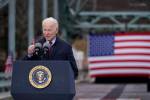Up in the air: Targeting subsidies for rural service
Last week, we detailed the example of the paltry few millions spent disbursing the campaign funds generated by the "$3 checkoff" on our tax forms. Participation is down to pathetic levels, and even President Obama declined to accept such funds in his 2008 campaign.
Yet the White House has threatened to veto any elimination of this Watergate-era "reform."
And now -- it could have been chosen on purpose as another example of how even the smallest allocation, furthest removed from the core role of the central government, struggles valiantly for life -- come the rural airport subsidies.
Sen. John McCain, R-Ariz., has proposed an amendment to an aviation bill pending before the Senate in order to eliminate the $200 million "essential air service program," asking just what's so "essential" about it. The program pays airlines to provide scheduled service to about 150 communities where the service would otherwise prove too costly, from Muscle Shoals, Ala., to Pelican, Alaska.
In the House, the Republican Study Committee has also proposed killing the program.
Subsidies per airline passenger as of June 1, 2010, ranged from a low of $9.21 in Thief River Falls, Minn., to a high of $5,223 in Ely, 250 miles north of Las Vegas, according to Transportation Department data for the lower 48 states.
The program was created to ensure that less-profitable routes to small airports wouldn't be eliminated when airline service was deregulated in 1978. But critics say urban growth over the past three decades has placed transportation alternatives -- other airports, trains and bus service -- within a reasonable distance of many of these communities.
The program, though, has proved "remarkably resilient, partly due to the protection it receives from lawmakers from rural states and districts," The Associated Press reports. In addition, many lawmakers don't feel it's worth upsetting the few people the program serves to achieve what amounts to a modest savings in federal budget terms.
But if that attitude persists for matters that are hardly life-or-death, imagine how budget-cutters will fare when it comes time to take their tiny nail clippers to foreign aid, overseas troop deployments, Social Security and Medicare.
No one wants to do harm to the economies of Elko or Ely. But folks who move to rural areas realize they'll have to give up operas, symphonies and other compensations that come with an urban snarl -- including convenient air transport.
Seeking trims that will provoke no squawking is a fruitless endeavor. Rep. Dean Heller and the rest of Nevada's congressional delegation could take large steps to show they understand the urgency of deficit reduction by setting aside parochial interests to say yes, the time has come to let local air transportation stand or fall based on free-market economics -- even in rural Nevada.























